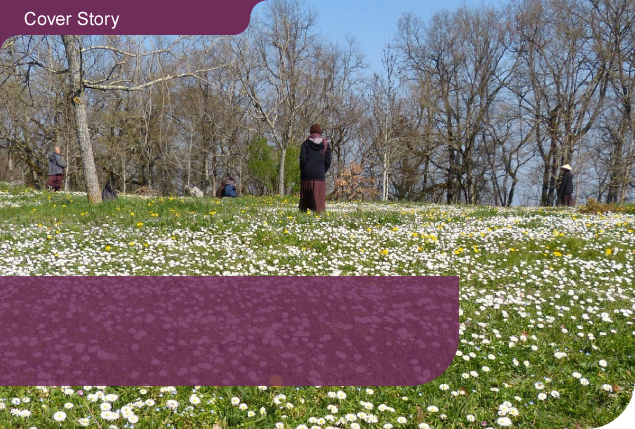Mental and emotional well-being are not just the purview of psychologists and psychiatrists. Philosophers are interested, too, including Dr Timothy O’Leary, Associate Professor of Philosophy, who also holds a Masters degree in counselling and works with clients in a small private practice.
Dr O’Leary instigated the ’Happiness East and West’ project in his Department in 2009 to look at various factors that affect happiness, including pain and suffering and, more recently, emotions.
“Traditionally in philosophy, emotion has been seen almost as the enemy. Philosophy is about reason and truth and so on and emotion is messy and deceives us. But there is a greater sense nowadays that even within philosophy, you have to take emotion into consideration. That’s especially true if you’re addressing happiness and well-being,” he said.
Happiness in itself is a topic that has come in and out of favour in philosophy. Confucius wrote of joy and pleasure, but not happiness. The ancient Greeks saw happiness not so much as a state of psychological well-being – which is the modern Western view – but as something that could be discerned by others.
“The Greeks thought of happiness as an objective thing. So if your life is going well and you have friends, then you are happy or blessed. Whereas today our concepts of happiness tend to be much more about how we are feeling right at this moment in our lives, what our emotional state is,” he said.

Traditionally in philosophy, emotion has been seen almost as the enemy. Philosophy is about reason and truth and so on and emotion is messy and deceives us. But there is a greater sense nowadays that even within philosophy, you have to take emotion into consideration.
Dr Timothy O’LearyThe flip sides of feeling happy
The linking of one’s feelings to happiness raises the question of whether happiness and emotional or mental health are equal partners. Can you be happy if your internal life is in turmoil?
“I don’t think they’re synonymous,” he said, “but they’re pretty closely related. A person suffering from a serious psychological disorder, such as depression, is not going to be able to achieve things or feel good, but that is not the only thing that stops a person from being happy. Your partner could die, terrible things could happen to your children – you might have mental health but you aren’t going to be happy any more. Mental health is about resilience and coping with these things.”
Conversely, happiness can embrace other emotions besides cheerful ones, as reflected in the projects under ’Happiness East and West’, including an international conference on happiness, seminars related to pain and suffering (see Bulletin May 2012, Volume 13, Number 2), a contracted book by Post-doctoral Fellow Edoardo Zamuner on the philosophy of emotions, and a forthcoming special edition of Philosophical Topics on happiness, edited by Dr O’Leary and Dr Zamuner.
“You can be sad or angry but it doesn’t mean you’re not happy,” Dr O’Leary said. Emotional regulation makes the difference and this nuanced understanding is important in understanding happiness.
“Emotions are difficult, they’re painful, they’re confusing. For a more rounded concept of happiness, you have to take them into consideration. A person living a happy life would have to be someone in touch with their emotions, who experiences them, follows them and also knows when not to follow them. That’s where emotion regulation comes in.
“There’s a great line in Aristotle: ‘Anybody can become angry – that is easy. But to be angry with the right person and to the right degree and at the right time and for the right purpose, and in the right
way – that is not within everybody’s power and is not easy.’”
Anger as a disguise
The Roman senator Seneca also wrote on anger, saying one of the difficulties was that people enjoyed it.
“I say to my clients that it’s much easier to be angry at a person than to be sad about them. A lot of problems come from certain emotions being disguised as other emotions.” Which feeds back into happiness and mental health because they can affect relationships.
“In ancient Western philosophy, one of the roles of philosophy was as a kind of therapy. Seneca for example said, look at all these Roman senators getting angry with each other and making life difficult for everyone. How should we deal with this anger? One thing he recommended was to talk about it, which can modify the anger,” he said.
That thought connects with the counsellor in Dr O’Leary. As with anger, happiness is something that can be talked out, too, at least from a philosophical perspective, and as with anger it can run its course. Once the current publications are finalised, the ’Happiness East and West’ project will likely come to an end. “My interest in happiness now is being satisfied through my work in counselling,” he said.■


